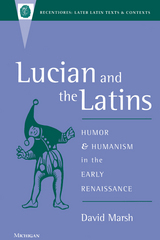Menander and the Birth of Domestic Drama
University of Wisconsin Press, 2024
eISBN: 978-0-299-34968-4 | Cloth: 978-0-299-34960-8
Library of Congress Classification PA4247.B76 2024
Dewey Decimal Classification 882.0109
eISBN: 978-0-299-34968-4 | Cloth: 978-0-299-34960-8
Library of Congress Classification PA4247.B76 2024
Dewey Decimal Classification 882.0109
ABOUT THIS BOOK | AUTHOR BIOGRAPHY | REVIEWS | TOC
ABOUT THIS BOOK
Although few of his plays exist in full today, the fourth-century BCE Greek dramatist Menander was known far and wide throughout antiquity. He was one of the first to locate his dramas in the common household, rather than the mythic world of gods and heroes, and is now recognized as one of the pioneering figures of ancient Greek “New Comedy.”
The design of the Greek stage was such that the interiors of houses were almost never shown, which posed difficulties for a playwright interested in staging the domestic lives of ordinary people. Here, Mitch Brown dissects how Menander responded to this challenge. As Brown demonstrates, Menander successfully conjured offstage action and even characters in the audiences’ imaginations; these offstage universes, Brown argues, are fundamental to understanding Menander’s dramaturgy and its reception in later centuries. Menander’s offstage methods and the new type of play (domestic drama) that he inaugurated directly influenced Western theater into the early modern period—and the impact of his innovations can still be seen indirectly today.
The design of the Greek stage was such that the interiors of houses were almost never shown, which posed difficulties for a playwright interested in staging the domestic lives of ordinary people. Here, Mitch Brown dissects how Menander responded to this challenge. As Brown demonstrates, Menander successfully conjured offstage action and even characters in the audiences’ imaginations; these offstage universes, Brown argues, are fundamental to understanding Menander’s dramaturgy and its reception in later centuries. Menander’s offstage methods and the new type of play (domestic drama) that he inaugurated directly influenced Western theater into the early modern period—and the impact of his innovations can still be seen indirectly today.
See other books on: Birth | Domestic drama, Greek | Greece | Menander | Menander, of Athens
See other titles from University of Wisconsin Press














